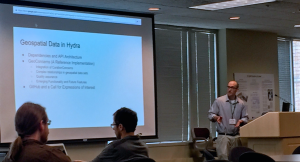DSS contributes to developer community at HydraConnect 2015
 Lafayette’s Digital Scholarship Services is once again in the forefront of library repository development. At this year’s HydraConnect Conference, DSS developer James Griffin shared his work with the burgeoning community of Hydra developers.
Lafayette’s Digital Scholarship Services is once again in the forefront of library repository development. At this year’s HydraConnect Conference, DSS developer James Griffin shared his work with the burgeoning community of Hydra developers.
Hydra is an Open Source software that, together with the repository system Fedora, forms the basis of many institutional repositories and is the foundation for preservation and discovery for many digital archives. Griffin is part of a working group looking to expand the uses of Hydra to include the preservation and display of GIS data within library repository systems. While this kind of work is largely invisible to the casual user, it can make a lasting impact on future development.
In designing the architecture of this new functionality, Griffin finds himself in excellent company working with a handful of other like-minded developers from Stanford, Princeton, and the University of Alberta, who form the GIS Data Modeling Working Group. The conference provided the occasion for the group to present their initial data models. In these initial stages, the group has begun to break down the complex data components of GIS files into a structure compatible with the repository’s internal organization and consistent with existing data models for other types of information.
The group participated in a poster session and also sponsored an “unconference” session, a free form discussion whose topics are determined by the conference goers. In addition, Griffin presented a lightning talk on their data model. “Our presentations have generated a lot of interest in how we have addressed our use cases using linked open data in the Resource Description Framework,” explains Griffin. “While few are working on GIS related projects our project gives weight to the idea that Hydra is flexible and versatile. It’s more than just a repository solution.” This work, now cutting edge, will help to guide future development in Hydra and expand its potential applications in digital library infrastructure.
Through Griffin’s work, Lafayette is an increasingly important player in this arena and the working group will present their latest developments next month at the Digital Library Federation conference in Vancouver, and at the Geo4LibCamp at Stanford University in January.
